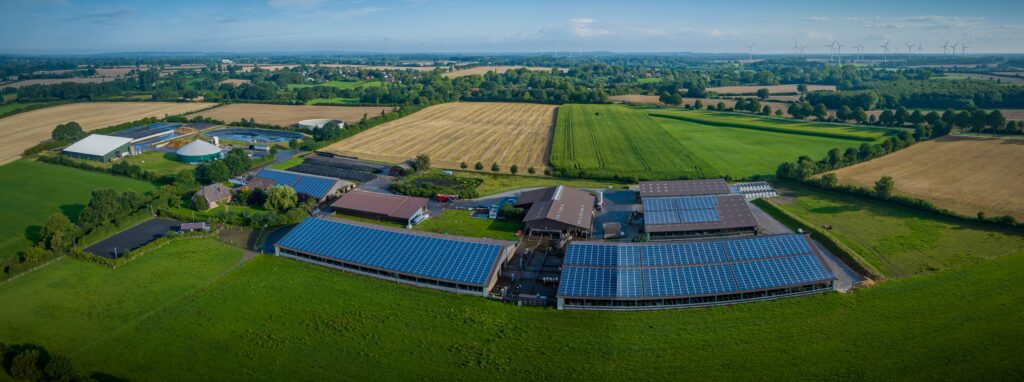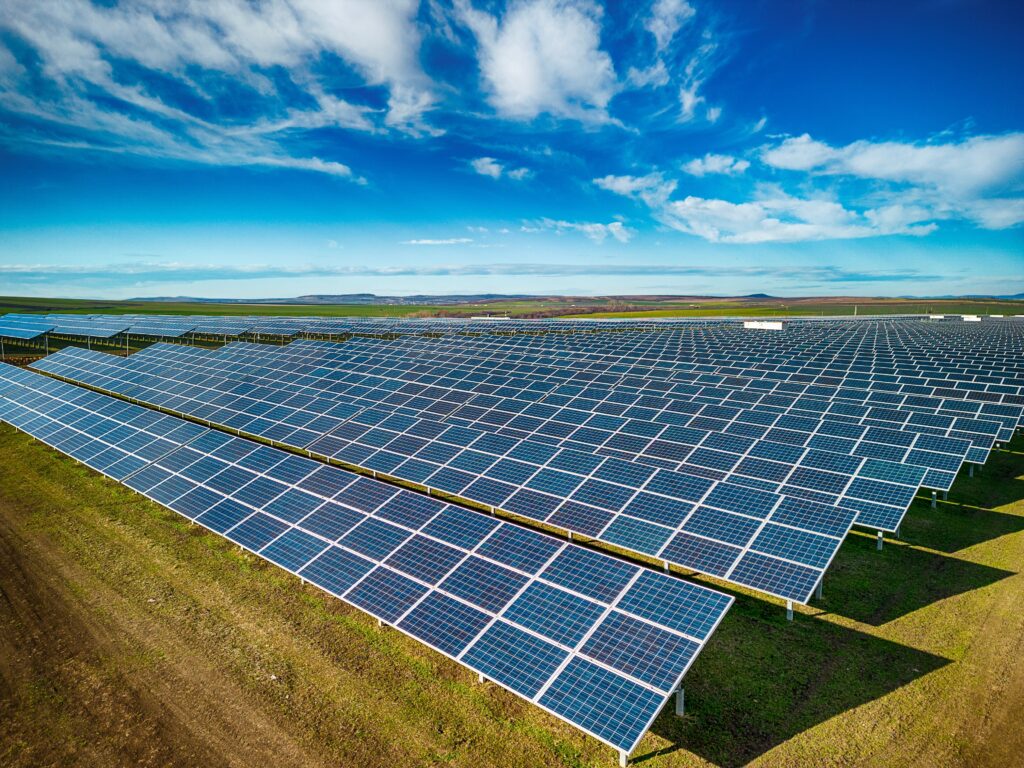Farming is at the heart of the UK economy, playing a vital role in feeding the nation and supporting rural communities. But like many industries, agriculture is under pressure to adapt to changing conditions – rising energy costs, climate targets, and the need for long-term income resilience. That’s where solar panels for farms come in.
For UK farmers, solar power is practical, cost-effective way to future-proof agricultural operations, all whilst producing clean energy. Whether you’re looking to install solar panels on farm buildings or considering turning part of your land into a solar panel farm, the opportunities are growing rapidly.
In this guide, we’ll walk you through how commercial solar panel installation can work for farms, the benefits it brings, and how you can make the most of your land.
How Solar Panels for Farms Work

When we talk about solar energy sources in agriculture, we’re usually referring to photovoltaic (PV) panels. These convert sunlight into electricity that can be used on-site or sold back to the grid. For farmers, this opens up a range of options for energy generation, from mounting solar panels on barns and outbuildings to setting up a larger solar panel farm on spare land.
Solar panels for farms are typically installed in one of two ways. First, rooftop solar, where solar panel systems are added to existing structures like grain stores, cow sheds, or machinery barns. Second, ground-mounted solar farms, where unused or lower-grade land is transformed into a small or large-scale commercial solar installation. Either approach can drastically reduce your reliance on national grid energy, and even turn a profit over time.
Commercial Solar Panel Installation: What It Involves
A commercial solar panel installation begins with a site assessment. This determines whether your buildings or land receive enough sunlight throughout the year to justify the investment. From there, solar experts will design a tailored system based on your energy use, grid connection, and land availability.
Unlike domestic systems, commercial solar installations for farms are often larger in scale and may require planning permission, especially for ground-mounted systems. You’ll also need to ensure the installation is connected properly to the local grid, particularly if you plan to export surplus electricity via the Smart Export Guarantee (SEG) or Octupus Energy scheme. But the good news? Most reputable commercial solar installers, like DRW, will handle this process for you.
Financial Benefits of Solar Panels for Farms
Reduced Energy Bills
One of the most immediate benefits of solar panels for farms is a significant reduction in your electricity bills. Farms are typically high-consumption businesses, running milking machines, cold stores, irrigation systems, and heavy machinery. Independent electricity generation means you buy less from the grid, shielding you from price hikes.
Income from Exporting Electricity
Thanks to the UK’s SEG scheme, farms that generate more electricity than they use can sell the excess back to the grid. Over time, this can turn your solar system into a reliable income stream. Even a modest solar panel for agriculture setup can yield thousands of pounds a year in additional revenue.
Long-Term Investment Value
Although commercial solar installation does require upfront investment, the long-term returns are strong. Panels typically last 25 years or more, with minimal maintenance. Combined with government-backed incentives and lower operating costs, the return on investment makes a compelling case for most farms.
Solar Panel Farms and Dual-Use Land

A growing trend in UK agriculture is the development of dual-use land, where farmers combine traditional farming with solar power generation. Known as agrivoltaics, this approach allows you to run a solar panel farm while still grazing animals or growing low-height crops between the rows of panels.
This not only increases the productivity of your land but also boosts biodiversity and land resilience. According to Solar Energy UK, solar panel farms use less than 1% of UK farmland, and many are located on lower-grade soil that wouldn’t otherwise be productive.
Dual-use sites are especially appealing to farmers looking to diversify their income without compromising food production. You could, for example, lease part of your land to a solar developer while continuing to farm sheep or manage the remaining acreage.
Environmental Benefits of Solar Panels on Farmland
Reducing Carbon Footprint
By switching to renewable energy for business operations, farms can significantly cut their carbon emissions. This not only supports the UK’s broader climate goals but also helps farms meet growing demand for sustainable and ethically produced food.
Enhancing Biodiversity
Solar panel farms often introduce wildflower margins, undisturbed grassland, and pollinator-friendly habitats around their infrastructure. In contrast to traditional monoculture practices, this enhances biodiversity and soil health, not just a reduction in fossil fuels.
Water Conservation
Solar panels on farmland can also support water management. By providing partial shade, panels reduce evaporation from soil and plants, an increasingly valuable benefit as climate change affects UK weather patterns.
Planning, Permissions & Practicalities
If you’re considering a commercial solar panel installation, it’s essential to check local planning regulations. Rooftop solar panels for farm buildings typically fall under permitted development. However, ground-mounted solar panel farms often require full planning applications.
Installers can help manage this process, from obtaining grid connection to submitting environmental impact assessments if required. You’ll also need to assess the orientation, shading, and structural capacity of your buildings if opting for rooftop solar.
Maintenance is relatively minimal. Most solar panels are self-cleaning in the UK climate, and a professional inspection every few years is generally sufficient.
Why Now Is the Right Time for Farmers to Go Solar
There’s never been a better time to install solar panels for farms. Energy prices remain unpredictable, climate targets are tightening, and the need to future-proof farming businesses is greater than ever. Whether you’re looking at a small rooftop solar array or considering converting part of your land into a solar panel farm, the long-term gains are hard to ignore.
Farmers across the UK are already leading the way. From dairy farms installing rooftop solar to arable farms diversifying into renewable energy for business stability, the case for solar is both financial and environmental.
Let DRW Help You Harness Solar for Agriculture
At DRW, we specialise in commercial solar installation for UK farms, amongst other solar technologies. Our team understands the unique energy needs and planning challenges of agricultural clients, and we’re here to guide you every step of the way.
From assessing your roof space to planning a solar panel farm, we provide tailored advice and full-service support. Whether you want to power your daily operations or turn unused land into a renewable energy asset, DRW makes it simple, efficient, and cost-effective.
Ready to find out how solar panels could benefit your farm? Get in touch with our expert team today for a free site assessment and quote.


